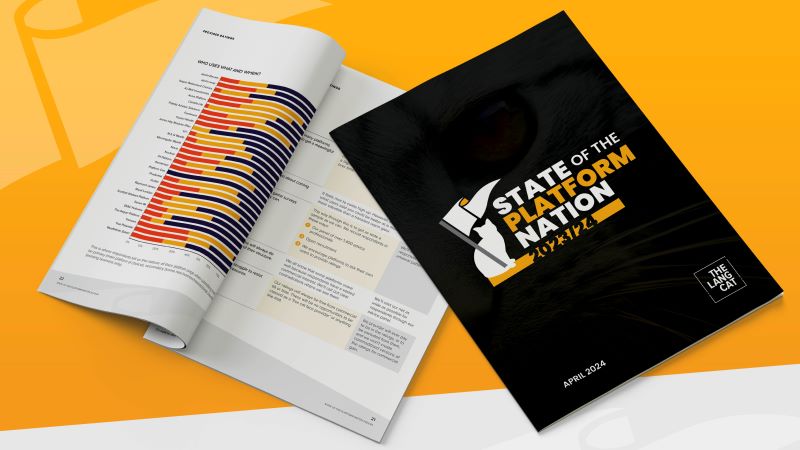We are now out the other side of our two biggest annual insight reports here at the lang cat – State of the Advice Nation wave six, which came out in February, and State of the Platform Nation, published this week.
Together they represent a whole lot of analysis, so we thought it was worth taking stock of what all that data tells us about how the platform sector might take shape in the coming months and beyond.
We’ve based this on SOTPN data in the main, with SOTAN findings mixed in where relevant.
WHAT WE EXPECT TO STAY THE SAME
Sorry to be the messenger of doom, but following the levels of outflows we saw last year we expect these to remain high for the foreseeable.
Interest rates are high and aren’t likely to drop significantly any time soon. Clients coming to the end of fixed-rate deals may continue to look to lump sum withdrawals to help with clearing down mortgage debt.
High interest rates also mean rates on cash savings still look attractive, no matter how many times we parrot about the importance of “time in the market, not timing the market.”
Both these factors represent a challenge for platform revenue, at a time when markets will be subject to the uncertainty of elections here, in the US and round the world. Plus the fact platform charges are only going one way, and the continued scrutiny of approaches to platform cash.
WHAT WE EXPECT TO BE DIFFERENT
There is a space between the traditional platform/advice professional relationship and the adviser as platform model which we see as ripe for competition in the near future.
From our findings across SOTAN (waves five and six), we know that many advice firms are considering the adviser as platform model before discounting it.
There are a few elements at play here:
- Service: Rather than leaving client experience to platform fate, some firms, particularly larger ones, like the idea of bringing platform service in-house. Of course, making platform service your responsibility comes with the same challenges platforms face: recruitment, staff retention, training and all the rest of it.
- Strategic control: Adviser as platform means you’re no longer at the behest of replatforming or a change in platform ownership, and the disruption and uncertainty that goes with that. Firms though may go through their own replatforming/ownership changes, and then they’re back to square one facing the same problems they were trying to get away from.
- Propositional control: With adviser as platform, you can choose what you want to focus on. You control your own destiny. The development roadmap is yours to own. Then again, the roadmap is yours to own. That needs resources and ongoing maintenance at the very least, as well as knowing how to cope with regulatory change (and then delivering it).
- Independence: One platform for all your clients, without relying on third parties. This might work in theory, but to work in practice firms need to be hot on their target client definitions, and have a viable alternative where their platform isn’t suitable.
- Commercial opportunity: Adviser as platform offers an additional revenue stream for firms, but this needs to be balanced against the associated costs.
There is definitely appetite and interest in partnering with the likes of Seccl, SS&C Hubwise and Fundment, among others. Some have already made the jump, but others are adopting a watching brief.
For those that are interested but not ready yet, some choose to negotiate on pricing, while others are looking to outsource or white-label more platform functions but are stopping short of complete platform responsibility. This last one is where we see space for competition to take hold.
WHAT COULD MAKE A COMEBACK
Guaranteed products. We know these products didn’t exactly win advisers’ hearts and minds the first time round, on account of being too expensive and too complex. That was the perception anyway.
Yet we are seeing the mood music starting to shift.
The latest edition of SOTAN points to 44% of respondents being open to guaranteed products (while, it has to be said, maintaining a healthy dose of scepticism). Only 18% believed guaranteed products will always be too expensive an option, and 28% were open to a new wave of guaranteed products, provided these can fit within existing centralised investment propositions.
This shift may be underway already, what with the likes of Just and Sparrows Capital getting in on the action. (More on this and emerging retirement propositions from Mark here)
There’s also the idea of a centralised retirement proposition, separate from the investment process, which could yet gain traction.
The FCA ran the rule over retirement income advice as part of its recent thematic review, and alongside the good practice examples that were called out, there were areas of concern for the regulator as well.
Post Consumer Duty, there is an emphasis on having clear target market definitions, regardless of whether this is part of a standard investment process, retirement process, or anything else. The message here: expect to be able to show how you’re delivering consistent outcomes for clients, both in the run-up to and at retirement.
That’s what the FCA expects of advisers, but it stands to reason advisers will be expecting platforms to do the same for them and their clients.






